College of Pharmacy dean, alumna is committed to success of others
The UGA Alumni Association is proud to spotlight Kelly Smith (BSPH ’92, PHARMD ’93), dean of the UGA College of Pharmacy, who returned to her alma mater in late 2018.
The UGA Alumni Association is proud to spotlight Kelly Smith (BSPH ’92, PHARMD ’93), dean of the UGA College of Pharmacy, who returned to her alma mater in late 2018.
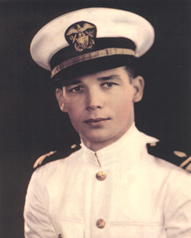
Dr. Joseph Lee Parker Jr. served in the 6th Beach Battalion. Photo via the U.S. 6th Naval Beach Battalion.
75 years ago today, over 160,000 Allied troops landed on the beaches of Normandy, France, to fight Nazi Germany. Known as “D-Day”, thousands of soldiers were killed and wounded, but Allied victory allowed for the beginning of the end of Hitler’s regime.
The UGA Alumni Association would like to share the story of Dr. Joseph Parker Jr. (BS ’38), an alumnus originally from Waycross, Georgia, who served as a United States Naval physician and was a part of the invasion of Omaha Beach on D-Day.
Parker was a member of the 6th Naval Beach Battalion. After the invasion, he treated wounded Allied and German troops for 21 days on the beach. In 2011, alongside 16 fellow World War II veterans, Parker was presented with the Legion of Honor medal from the French government.
Prior to joining the U.S. Navy, Parker earned his undergraduate degree from the University of Georgia and went on to earn a medical degree from the Medical College of Georgia in Augusta. While at UGA, Parker lettered in swimming, and was a member of Sigma Nu fraternity. His children and grandchildren continued his Bulldog legacy and also attended the University of Georgia.
When Parker passed away in Greensboro, Georgia, on September 27, 2012, at the age of 95, he was the longest surviving Navy physician who served at Omaha Beach.
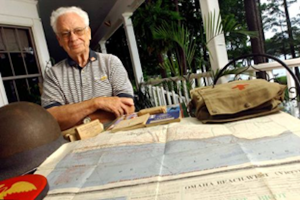
Dr. Parker in 2004. Shot by Allen Sullivan of the Athens Banner-Herald.
A Bureau of Medicine and Surgery interview from 1999 with Dr. Parker is available.
On this anniversary of an important day in our history, the Bulldog family would like to thank those who have served in the United States military, living or deceased.
We appreciate your service and we will never forget the sacrifices you made.
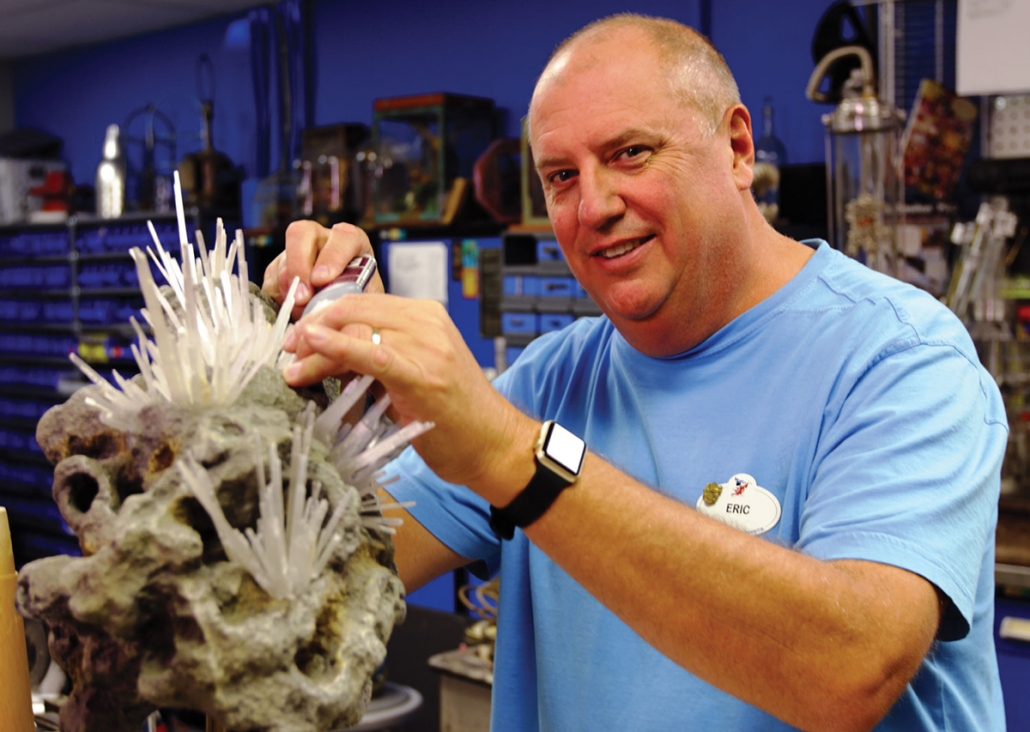
Eric Baker (ABJ ’90) is an Imagineer for The Walt Disney Company, with credits including just-opened Galaxy’s Edge.
*In honor of Galaxy’s Edge officially opening in Disneyland on May 31, UGA is highlighting Eric Baker (ABJ ’90), a Grady graduate and creative director with Walt Disney Imagineering.
This story originally ran in the Summer 2019 issue of Georgia Magazine.
A long time ago in a galaxy not so far, far away …
A young Eric Baker ABJ ’90 was making his own Star Wars playsets because store-bought versions weren’t good enough. The son of an art teacher and a building contractor, Baker made his own Yoda masks from forms he sculpted, molded, and casted with help from his mom.
Now, he’s a creative director with Walt Disney Imagineering, working on the Star Wars: Galaxy’s Edge-themed lands opening in Disneyland this summer and Walt Disney World this fall.
“I love taking these worlds and bringing them from film to something people can actually go see and touch and really be a part of,” he says.
Baker attended the University of Georgia where he studied telecommunications and theatrical design. He knew he wanted to make films, so he learned model building, special effects, and set design through his course work. As a student, his first job in the industry was at Cable 13 doing Larry Munson’s makeup for his Tuesday night show.
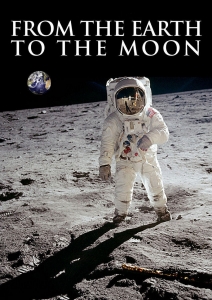
Baker’s work on the Tom Hank’s mini-series “From the Earth to the Moon” earned him an Emmy nomination.
After graduation, Baker found work at Nickelodeon doing props on the hit show Clarissa Explains it All, coming up with games to gross people out for Double Dare, and testing pool games for Nickelodeon Guts.
That led to other film and TV work including The Mickey Mouse Club, Sesame Street 3D Movie, Bad Boys 2, and the Tom Hanks mini-series From the Earth to the Moon (which earned Baker an Emmy nomination).
But after 20 years in film production, the industry was changing, so Baker took an entry level model-building job with Universal Studios’ creative department.

Baker built concept models for Universal’s Harry Potter theme parks in Florida, California, and Japan.
They asked him to build a castle—which turned out to be Hogwarts. For the next two years, Baker built concept models for Universal’s Harry Potter theme parks in Orlando, California, and Japan.
The worlds are fully immersive, from taking the Hogwarts Express train from Platform 9 ¾ to drinking a cold butterbeer on the giant benches of the Leaky Cauldron. The worlds are layer upon layer, from haunted portraits to fountains that come alive with a souvenir wand.
The work Baker did for Diagon Alley in Orlando (which has 106,000 props) was such a game changer that the Themed Entertainment Association created a new award for it: the Paragon award, which won’t be awarded again until someone tops the Wizarding World of Harry Potter.
And Baker is up to the challenge.

Galaxy’s Edge opened in Disneyland on May 30, and Disney World’s version will open August 29.
Disney took notice of Baker’s work and offered him the job he’d dreamed of since he was a young Padawan: Star Wars. Now he’s overseeing construction of thousands of pieces of props and set dressing for the immersive Star Wars: Galaxy’s Edge, which means a lot of flying between Florida and California (commercial, not on an X-wing).
He’s visited the Star Wars film sets and Skywalker Ranch where he photographed some of the original props from the film, which was another dream come true for him. “Star Wars changed my life,” he says.
But ultimately, his job comes down to using the Force for good.
“I love going to work in the morning to see the look on kids’ faces the first time they come into the park. That’s the most rewarding thing I do: making people happy.”
On May 21 and May 22, the UGA Alumni Association brought Athens to Savannah and Charleston to remind local alumni that their Bulldog community is wherever they are.
Want to see what the night was all about? Check out our Instagram highlights of both receptions:
We kicked things off at the Perry Lane Hotel on its Peregrin Rooftop. Over 150 alumni and friends joined us for a memorable evening overlooking historic Savannah.

While we were greeted with high temperatures, the stunning venue and an amazing turnout meant great conversations took place between Savannah alumni–from those who grew up there to those who had lived there for only a few weeks.

Nothing finer than a rooftop full of 150 new friends in red and black, right?
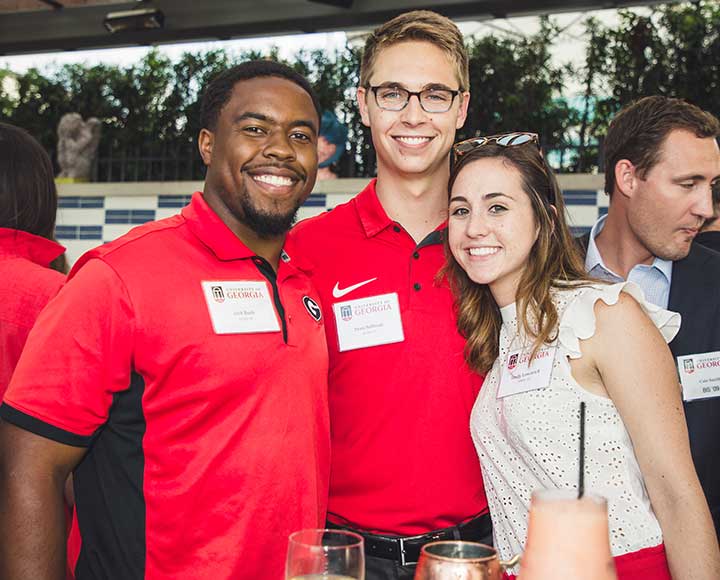
The next evening in Charleston we greeted local alumni with air conditioning, and shrimp and grits in part of the renowned Cigar Factory called The Cedar Room.

Behind the scenes, our Charleston Alumni Chapter President Stephen Scates filmed a shout-out for our Instagram story highlight (linked to above).
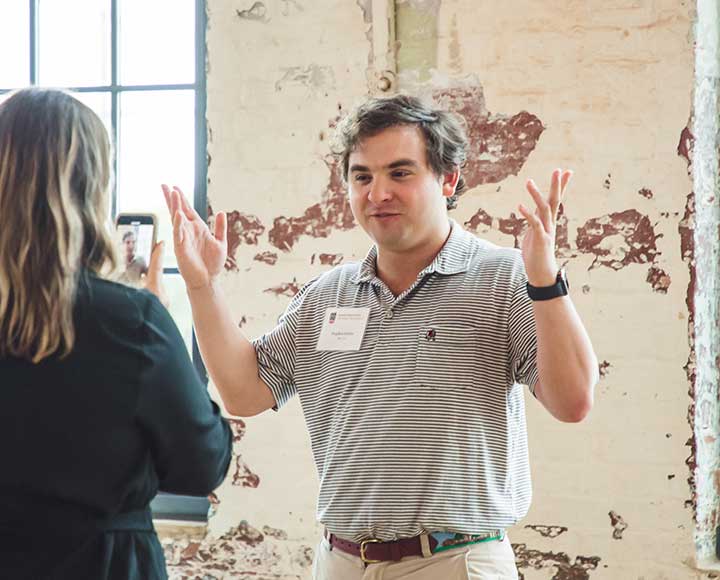
Executive Director of Alumni Relations Meredith Gurley Johnson (BSFCS ’00, MED ’16) shared news from campus, including announcing the UGA Mentor Program, a university-wide mentorship program that will connect students with alumni (alumni can begin signing up in mid-June).
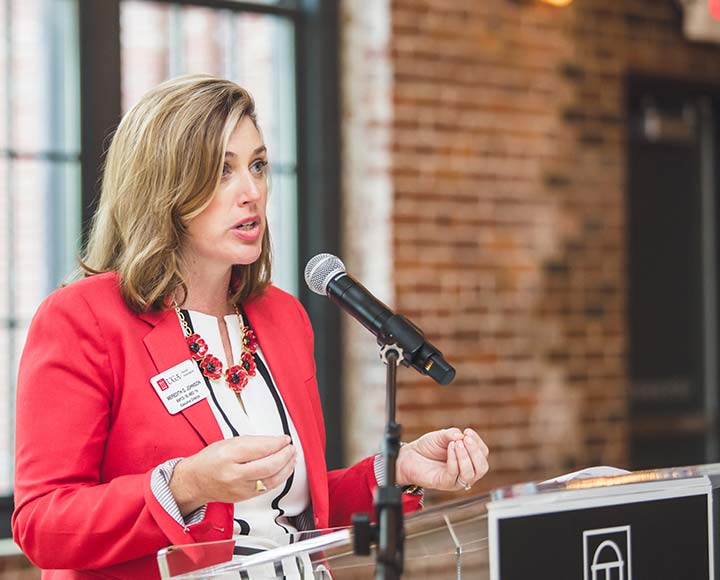
Somewhere between the giphy station and tacos, the Bulldog community in the Low Country grew a little closer. If you missed either of these receptions, make sure you’re aware of future events by signing up for your local chapter listserv on the Savannah or Charleston chapter pages.
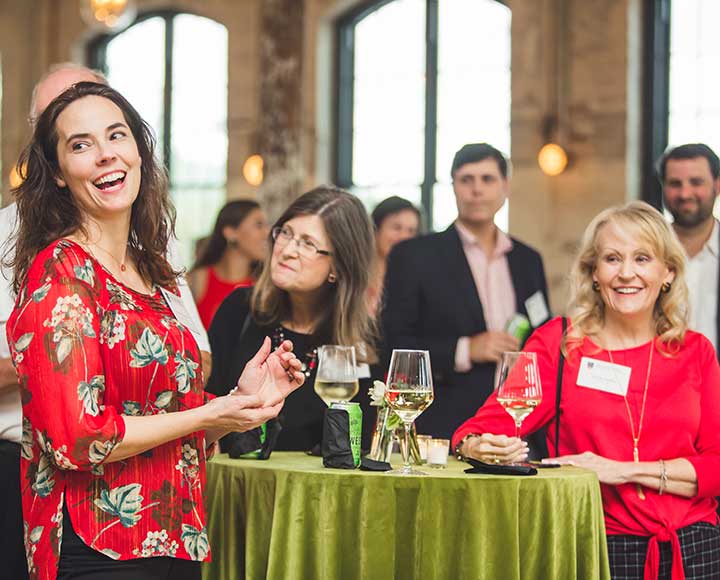
Looking for the next fun chance to connect with fellow Bulldogs? The Savannah Chapter will host a UGA Night at the Savannah Bananas on July 16. The Charleston Chapter is hitting the water with their third annual sunset cruise on June 14 with local BBQ catered by Home Team–sign up today so you don’t miss out!
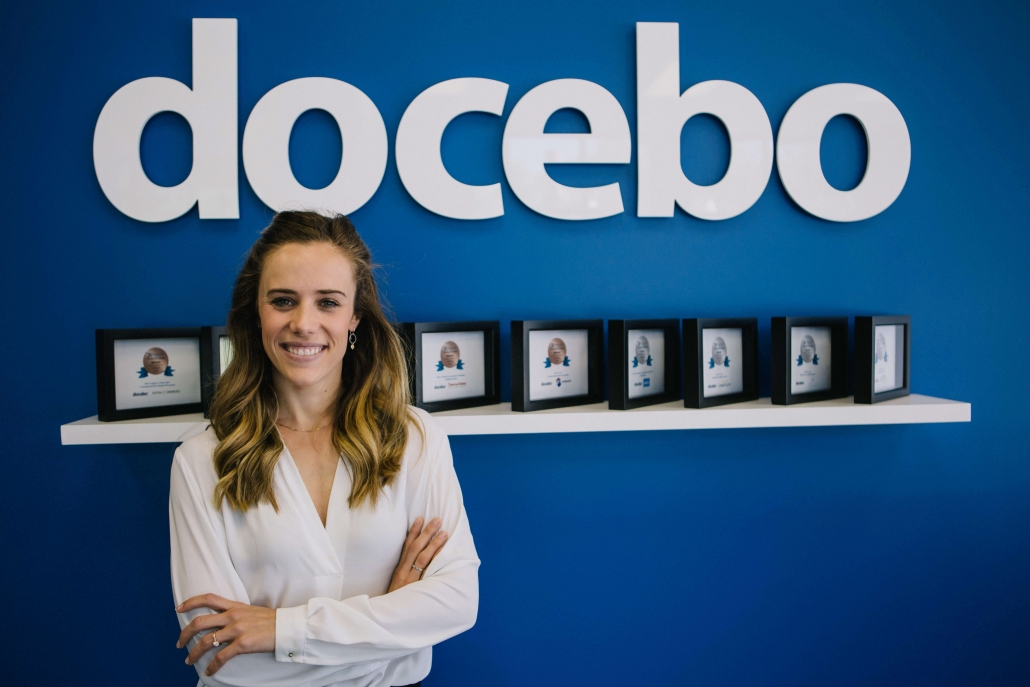
Rocio “Ro” Sanchez Lobato (AB ’15, MS ’17) works as a customer success specialist at Docebo.
Athens is celebrated for all it is home to. It is the home of the Georgia Bulldogs, home to renowned restaurants and live music venues and the home and birthplace of public higher education. What most do not realize is that Athens is also home to the North American location for the global tech company, Docebo. And that office is a prime example of the many benefits of UGA’s corporate partnerships.
Docebo, Latin for “I will teach,” provides a learning ecosystem for companies and their employees, partners, and customers designed to increase performance and learning engagement. The company’s artificial intelligence-powered learning platform blends social and formal learning and helps over 1,500 companies around the world. Docebo’s newest office in downtown Athens is booming, hiring motivated young employees like Rocio Sanchez Lobato (AB ’15, MS ’17).
Rocio, affectionately known as “Ro,” is a customer success specialist for Docebo. A native of Marbella, Spain, Ro made a name for herself stateside as a member of the UGA women’s golf team. Like many collegiate athletes, she struggled when it came time to turn in the clubs.
“It is hard to see opportunities past sports,” Ro says. “It is very hard to expose yourself to something different.”

Ro Sanchez Lobato’s (AB ’15, MS ’17) story is a demonstration of the strength of UGA’s corporate partners and partnerships.
Ro overcame these challenges with some help from UGA Athletics’ Career Development Program, a resource offered to athletes to help them transition from sports to careers. “Think of that thing you can do that no one else can,” says Leigh Futch, director of student athlete development and founder of The Georgia Way Network. Recalling these words helped Ro to find her niche at Docebo: bilingual communications. Because of her ability to speak fluent Spanish, Ro manages large accounts in South America.
Most students believe that they must leave Athens to find opportunity. Ro says Docebo is flipping that narrative by offering top-notch workforce experience and opportunities right here in Athens. With an abundance of full-time positions and internships in sales, account management, customer support and company implementation, Docebo provides new and exciting learning opportunities for UGA students and alumni alike.
“We need more companies like Docebo in Athens,” Ro states. “We are like a big family—we do stuff together outside of work. Someone is looking out for you and pushing you to be better. With Docebo, you learn so much.”
Before stepping into her current role, Ro had no formal tech training. Now, Ro teaches and talks about Docebo’s tech with the accounts she manages, and as a result, she encourages UGA students from all backgrounds to apply.
Beyond its hiring efforts, Docebo partners with the university in several ways. Last year, the company opened its doors to students for an open house. Docebo also regularly sends company representatives to speak in Terry College of Business classes and attend university-sponsored sales competitions. Additionally, Docebo serves on the advisory board of the Management Information Systems program.
Corporate partners like Docebo, who pour their resources into the classroom, create a cyclical effect, helping students to grow, learn, and become high-quality job-seekers like Ro.
If your company is interested in engaging with UGA’s talented students, please visit itstartswith.uga.edu/corporate.
(Docebo photos by Emily Dukes)
On April 26, the annual Twilight Criterium will dash into Athens once again. With two days full of music, food and races, the weekend will continue to signify the official start of spring in downtown Athens. Since 1980, the Twilight Criterium has been a tradition that draws all kinds of cyclists into town for amateur and professional races. Including concerts, a 5K and plenty of activities for kids, Twilight weekend caters to college students, athletes and families.
If you’ve never heard of a criterium, don’t worry. The explanation is simple: it’s a closed circuit, or super short, track with lots of laps. It is similar to how a NASCAR race operates.

Twilight Criterium racers start their laps around downtown Athens. Photo by Bear Cieri/Athens Twilight Facebook
When the event first started, there were only 40 racers and the criterium only included one men’s professional race. This year will feature the second annual “joy ride,” a 5-mile ride through Athens, and a 5K race. The main event takes place on April 27 and is the Twilight Criterium itself, an 80km race for men and a 40km race for women in the heart of downtown Athens. 2,000 people are expected to race this year.
The UGA Alumni Association caught up with Athens Twilight co-event director and Double Dawg Ashley Travieso, (BSED ‘05, MED ‘06). Ashley started at UGA in 2001 as a sports studies with an emphasis in sports communication. In undergrad, she was a member in the Georgettes in the Redcoat Band from 2001 to 2006, and was captain from 2002 to 2005. According to Ashley, she had no interest in cycling or even attending Twilight until co-founders Gene Dixon and Linda DePascale took her to lunch at Porterhouse and talked to her about becoming an intern for the event. The rest, as they say, is history.
Athens Twilight was the first of its kind. Since 1980, other twilight criteriums have been founded based off of Athens’ event, which now attracts racers from around the world. Ashley believes that people are drawn to Athens Twilight because “it’s the most insane criterium. The atmosphere is electric, there’s no other criterium in the world like it.” Everyone wants to win this particular race due to the exciting nature of the race itself and the crowd.
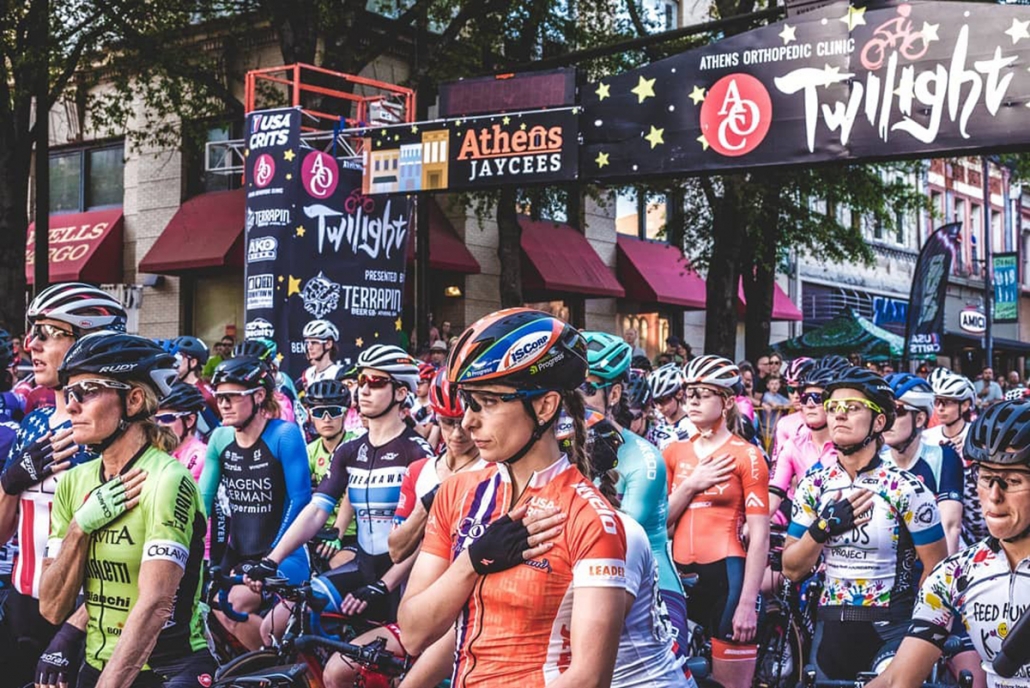
This year, Twilight expects to have 2,000 racers. Photo by Adam Koble/Athens Twilight Facebook
Be sure to visit downtown this weekend to check out the festivities surrounding the criterium.
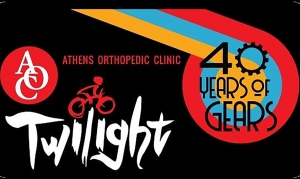
This is the 40th year of Athens Twilight. Graphic per the Athens Twilight Facebook page.
Event highlight days/times per website schedule:
Friday, April 26:
Noon-9 p.m.: Twilight Expo
Location: 100 College Avenue – College Square
6-7 p.m.: BikeAthens Joy Ride
Location: College Avenue Parking Deck
6-9 p.m.: Pre-registration pickup & event registration
Location: 200 College Avenue Parking Deck – Bottom Level
Saturday, April 27:
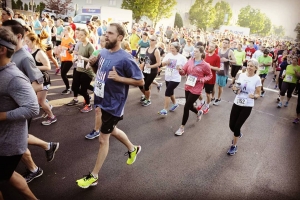
There is a 5K on Saturday morning. Photo by Bear Cieri/Athens Twilight Facebook
8-9 a.m.: Sparc Twilight 5K presented by Fleet Feet Athens
Location: College Avenue and Washington Street
10 a.m.-9 p.m.: Twilight Expo
Location: 100 College Avenue – College Square
7-8:10 p.m.: AOC Twilight Women’s PRO/AM presented by Terrapin Beer
Location: Downtown Athens – College Avenue and Washington Street
8:30-10:15 p.m.: AOC Twilight Men’s PRO/AM presented by Terrapin Beer
Location: Downtown Athens – College Avenue and Washington Street
University of Georgia alumni, friends and students assembled in London on Thursday, April 4, to celebrate UGA, honor the UGA at Oxford program’s 30th anniversary and cap off a tour of London that welcomed the newest UGA at Oxford students to the United Kingdom.
Twenty-two UGA students embarked on a tour of London that Thursday morning. Their stops took them to businesses around the city where alumni employees talked to them about what they do, where they work, the impact of their UGA education and more. These talks covered a wide variety of fields, from Risk Management and Insurance to Neuroscience—participating alumni work for Google; McGriff, Seibels and Williams; BNP Paribas; New York Times; City, University of London; Braincures; and Citibank.
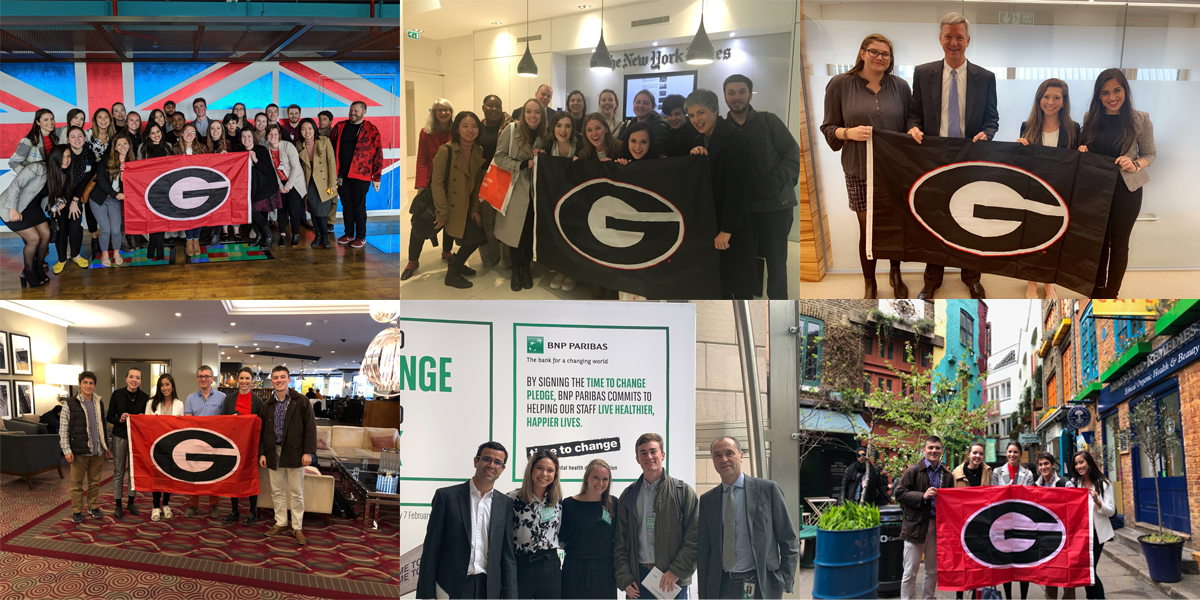
After a day traveling the city, the tour party met with other alumni and friends at The Marylebone, where Kelly Kerner, UGA vice president for development and alumni relations, and Jamie McClung, director of the UGA at Oxford program, spoke to the crowd about what London and the Oxford program mean to UGA.
With the number of Dawgs in attendance that evening, one might have thought The Marylebone had moved to downtown Athens.
Special thanks to the alumni who hosted and spoke with our students during their tour of London: Brian Benedict (ABJ ’04), Kevin Blackburne (BBA ’15), Denis Cruiziat (MBA ’88), Emmanuel Dray (MBA ’95), Justin Foster (BSFCS ‘10) Carrie Gibson (ABJ ’98), Krzysztof Potempa (BS ’02), Jane Singer (ABJ ’76), Scott Sink (BBA ’84), Chris Stanford (ABJ ’94) and Wes Walraven (BBA ’83).
Bulldogs can be found the world over – find your local alumni chapter to to socialize, network, and volunteer with Bulldogs in your area.
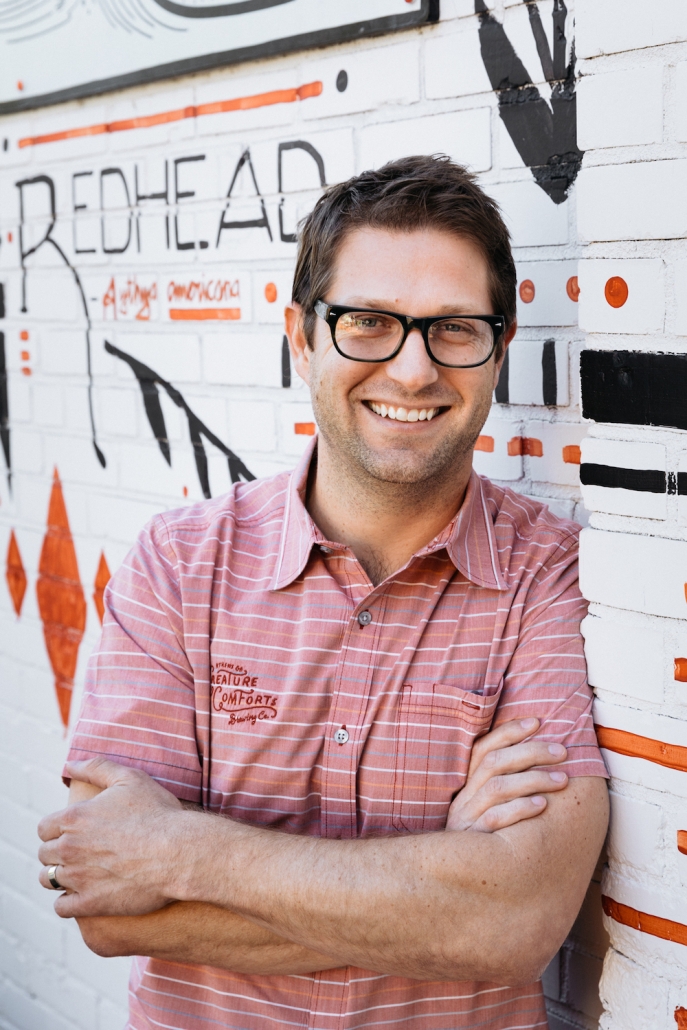 Matt Stevens (AB’03, MPA’14) is the Director of Community and Culture at Creature Comforts Brewing Co. in Athens. For National Beer Day we’re asking the questions everyone wants to know – from how Creature Comfort’s philanthropy started to Stevens’ top three favorite beers.
Matt Stevens (AB’03, MPA’14) is the Director of Community and Culture at Creature Comforts Brewing Co. in Athens. For National Beer Day we’re asking the questions everyone wants to know – from how Creature Comfort’s philanthropy started to Stevens’ top three favorite beers.
The fact that your role exists is unique. You’re clearly passionate about the Athens community, how did that come about?
My role tries to activate the same value with both an internal and external focus, that value being the question of how to use a company to add value to people’s lives. The external focus is, obviously, the community side. Before we’d ever brewed any beer—before there was Tropicalia—there was this value system. What we know how to do is brew beer. But why we do it, in part, is to add value to the community around us. We hope the city of Athens is better off because we’re here helping to support it.
As for my internal focus, we hope our employees view their work as more than “just a job.” We hope every hire is a lifetime hire. Not merely for retention purposes, but we look to invest in our people, and more than just professionally, but personally as well. It looks a lot of different ways, but that’s the basic framework: The simple question of how our employee experience can add value to our people. Great companies recognize that their employees can work anywhere. The fact that they’ve chosen to dedicate their careers to steward our brand demands that we endeavor to, in turn, invest back into them.
Share a little about the Get Comfortable Campaign.
Get Comfortable started in 2015, and initially it was just a slice of the year—from November to January. One of the first things we did once we had more bandwidth was to extend the campaign duration. We wanted this community impact work to be who we are, not just something we do. So today we launch the program every year in January and wrap mid-November, which gives us six weeks at the end of the year to close the books, to disburse funds, and then reload for the next year.
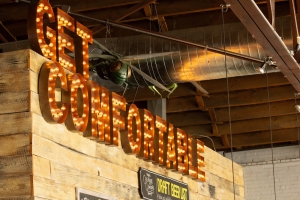 The program itself stems from our belief that companies have a role to play in the solutions of tomorrow. We cannot simply outsource social services work to the government or nonprofit agencies. Though both sectors absolutely have a role to play, the private sector has a responsibility as well. John Mackey, who founded Whole Foods, wrote a fantastic book a few years back titled Conscious Capitalism, wherein he makes the argument that companies can be capitalistic but also conscientious in the way they go about it. The Get Comfortable campaign, then, is our expression of this belief, our flagship program to participate in the civic wellbeing of our community.
The program itself stems from our belief that companies have a role to play in the solutions of tomorrow. We cannot simply outsource social services work to the government or nonprofit agencies. Though both sectors absolutely have a role to play, the private sector has a responsibility as well. John Mackey, who founded Whole Foods, wrote a fantastic book a few years back titled Conscious Capitalism, wherein he makes the argument that companies can be capitalistic but also conscientious in the way they go about it. The Get Comfortable campaign, then, is our expression of this belief, our flagship program to participate in the civic wellbeing of our community.
Specifically, we hope this program helps to align the business community to resource the agencies who do our city’s most pressing work. We hope to make serving as simple, as strategic, and as effective as possible for local businesses.
For a full list of the partners and events, visit GetCurious.com.
What was your favorite UGA memory?
I am going to have to go with a sports memory—my father and grandfather played football here so Georgia football memories run deep. I would say being with my dad in Jordan-Hare back in 2002 when we clinched the SEC East for the first time in years. It was the David Greene to Michael Johnson in the fourth quarter with 15 yards and basically zero seconds to go—I leapt into my father’s arms. It was just one of those classic Georgia sports memories.
Favorite UGA professor?
Richard Neupert. I took his introduction to film course—that’s why I not only changed my major but also why I went on to grad school. I received my masters in film studies from the University of Edinburgh before returning to UGA for a now-defunct PhD. Dr. Neupert and I still cross paths from time to time since he still serves on the board of Cine. He is so community-minded, but he’s also this incredible scholar and I admire him greatly.
What are your top three favorite beers?
Arcadiana, it is a barrel-aged saison. Subtle, juicy, delicious. If you like a saison, you should totally try this one.
The Silent World is one of our lesser known releases. It’s a black lager, which is a very unique style. Given its inky black appearance, our brewers named it in homage to the classic Jacques-Yves Cousteau documentary from the 1950’s titled Le Monde du Silence. As a former film scholar, I obviously appreciated the nod to quirky cinema.
This year’s Get Comfortable IPA is a collaboration with Russian River. It was a dream to have Vinnie and Natalie Cilurzo come from California this past January to work with our team on that recipe. The result is staggering, one of our best IPAs to date. And of course, all the profits go toward a philanthropic end.
What’s one of your favorite places to grab dinner post-Creature Comforts?
Got to go with my gut, Seabear. In a city full of incredible dining, it remains my very favorite.
Creature Comforts has expanded to the Southern Mill, which was previously a warehouse near Chase Street, what’s the future of Creature Comforts?
Opening the Southern Mill has given us tremendous new capacity. Throughout 2019 we are looking to continue expanding our distribution footprint statewide. For context, we opened our doors in April 2014 and from day one we were in only two markets, Athens and Atlanta, until last November. In November we opened Augusta and Columbus. And last month we opened up Savannah and more of coastal Georgia. So we’ve gone from two cities for four years to nearly the entire state in the last six months! The new tank capacity, then, has enabled us to release quite a bit more volume and, just as exciting, to create many new recipes through our innovation program. So both our customers and our brewers are pleased with the recent expansion.
The Masters Tournament is one of the four major championships held every year in professional golf. In fact, many would say the Masters is the most significant professional golf tournament of the year. With the 83rd tournament just days away, we wanted to highlight some of our notable alumni who are playing in the tournament this year.

photo by Golf News Net
Bubba Watson (BSFCS ’08) is not a new name in the Masters Tournament roster. Bubba, a native of Bagdad, Florida, has played in every Masters since 2008 and is a two-time champion of the tournament. Bubba was a member of the UGA Men’s Golf team in 2000 and 2001. During his time at UGA, Bubba earned many honors including: 2000 All-America and All- SEC recognition and he won the Schenkel Invitational. He later returned to UGA to complete his degree in 2008. As a professional golfer, Bubba has 12 PGA Tour victories and additional victories in the 2008 CVS/Caremark Charity Classic and the 2015 Hero World Challenge. He was also a member of the 2016 Men’s Golf Summer Olympic team in Rio de Janeiro. So far in 2019, Bubba tied the low score of the day to finish T4 at the Valspar Championship, finished 6-under and T15 in the Genesis Open and finished T4 in the Waste Management Phoenix Open. Follow Bubba on Twitter, Instagram and Facebook or check out his website for more updates on his career.
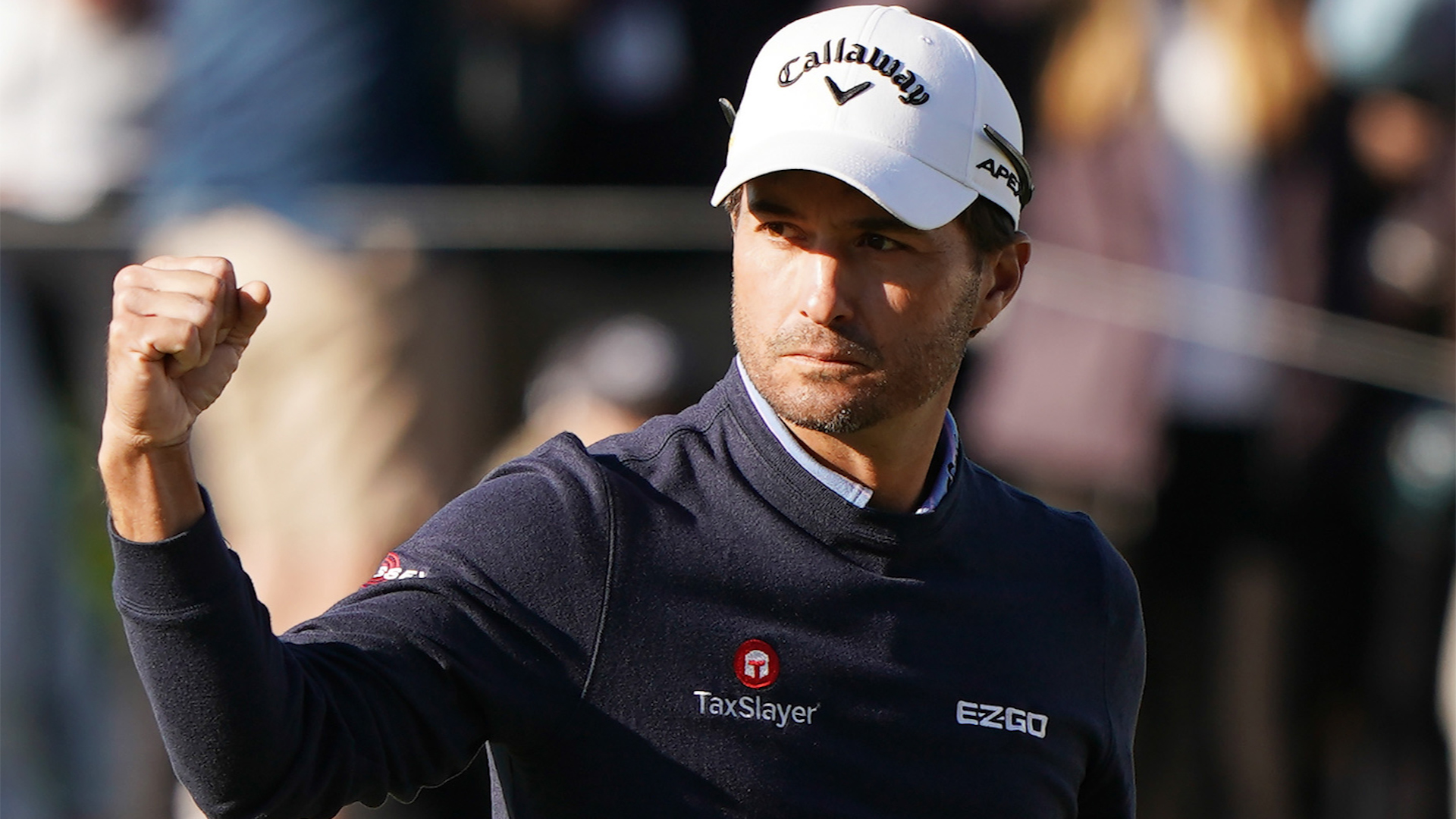
photo by golfchannel
Kevin Kisner (BBA ’06), is another talented alumnus who is playing in the Masters this year. Kisner is from Aiken, South Carolina, and was a member of the UGA Men’s Golf team from 2003-2006, including the NCAA Division I Championship team. As a golfer at UGA, he earned many honors including:14 top-10 finishes in his career, four-time All-American, three-time All-SEC, SEC Academic Honor Roll, and team captain After earning his degree from UGA, Kisner started his professional career. Kisner has three PGA Tour victories, including the 2019 World Golf Championships-Dell Technologies Match Play, and additional victories in the 2010 Mylan Classic presented by CONSOL Energy and the 2013 Chile Classic. In 2017, Kevin and his wife Brittany founded The Kevin and Brittany Kisner Foundation. A scholarship of $2500 is awarded to a senior from Aiken County High School from the foundation. Follow Kevin on Twitter or check out his website for more updates on his career.

photo by Golf Digest
Keith Mitchell (BBA ’14) is playing in the Masters for the first time this year. Mitchell is from Chattanooga, Tennessee, and was a member of UGA Men’s Golf team from 2011-2014. In 2013, he won the 2013 Bulldog Battle for Georgia. Recently, Mitchell won The Honda Classic, which earned him an invitation to this year’s Masters. Although this is his first PGA Tour victory, he gained experience playing in many PGA Tour tournaments such as the CIMB Classic, Sony Open in Hawaii, The CJ Cup @ Nine Bridges and the Arnold Palmer Invitational presented by Mastercard. Follow Keith on Twitter, Instagram and Facebook for more updates on his career.
Although these UGA Alumni are not playing in the Masters Tournament this year, both have had successful UGA and professional careers that have earned a large amount of recognition.
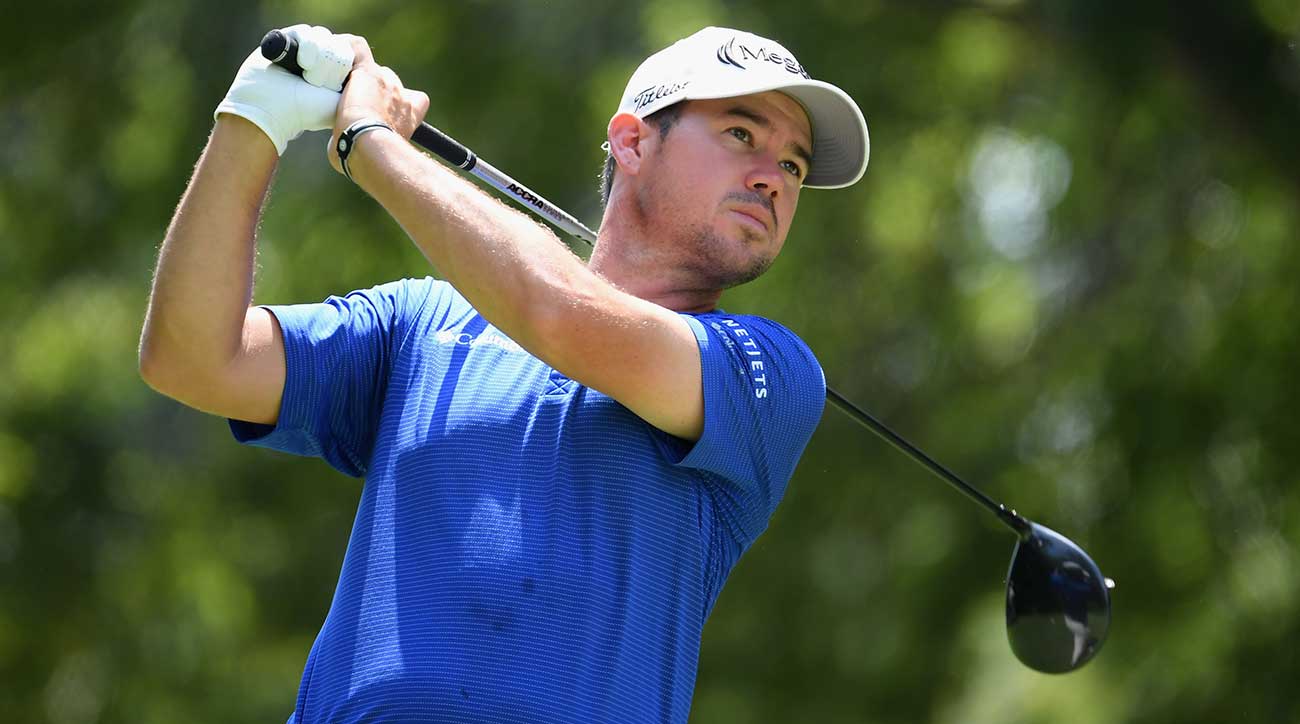
photo by golf.com
Brian Harman (BBA ’11) is a former UGA Men’s golf member from Savannah, Georgia. During his time at UGA, Harman was named to the 2007 SEC Academic Honor Roll, 2006-2007 First-Team All –SEC, 2006 All-American, 2006 Freshman of the year and more. Harman has two PGA tour victories in his professional career. His 2019 achievements include finishing T8 in The Players Championship. Follow Brian on Twitter and Instagram for more updates on his career.

photo by Racing Post
Russell Henley (BSFCS ’11) is a professional golfer from Macon, Georgia. During his collegiate career at UGA, Henley received honors including: 2009 All-SEC ,2009 All-American and the 2010 Haskins Award for outstanding collegiate golfer. Henley began his professional career in 2011 and has three PGA tour victories. His 2019 professional achievements include finishing T15 in the Waste Management Phoenix Open. Follow Russell on Twitter or check out his website for more updates on his career.
The Masters pre-tournament begins Monday, April 8. Round 1 of the tournament begins on Thursday, April 11. Live coverage of the Masters Tournament can be viewed on CBS and ESPN. For more information, visit masters.com.
Spring break is a time when strangers and university faculty group together to get on a bus and learn about agricultural sustainability, economic development and every other aspect of the state of Georgia that the University of Georgia impacts.
That’s not actually a traditional spring break, but it was spring break for the 25 students and various faculty members on the inaugural trip of the Student Tour of Georgia. Put together by the President’s Office, Office of the Vice President for Student Affairs and the Office of the Vice President for Public Service and Outreach, the Student Tour of Georgia was an experiential learning opportunity based off the longstanding New Faculty Tour created to teach students about what it means to be a land and sea grant university.
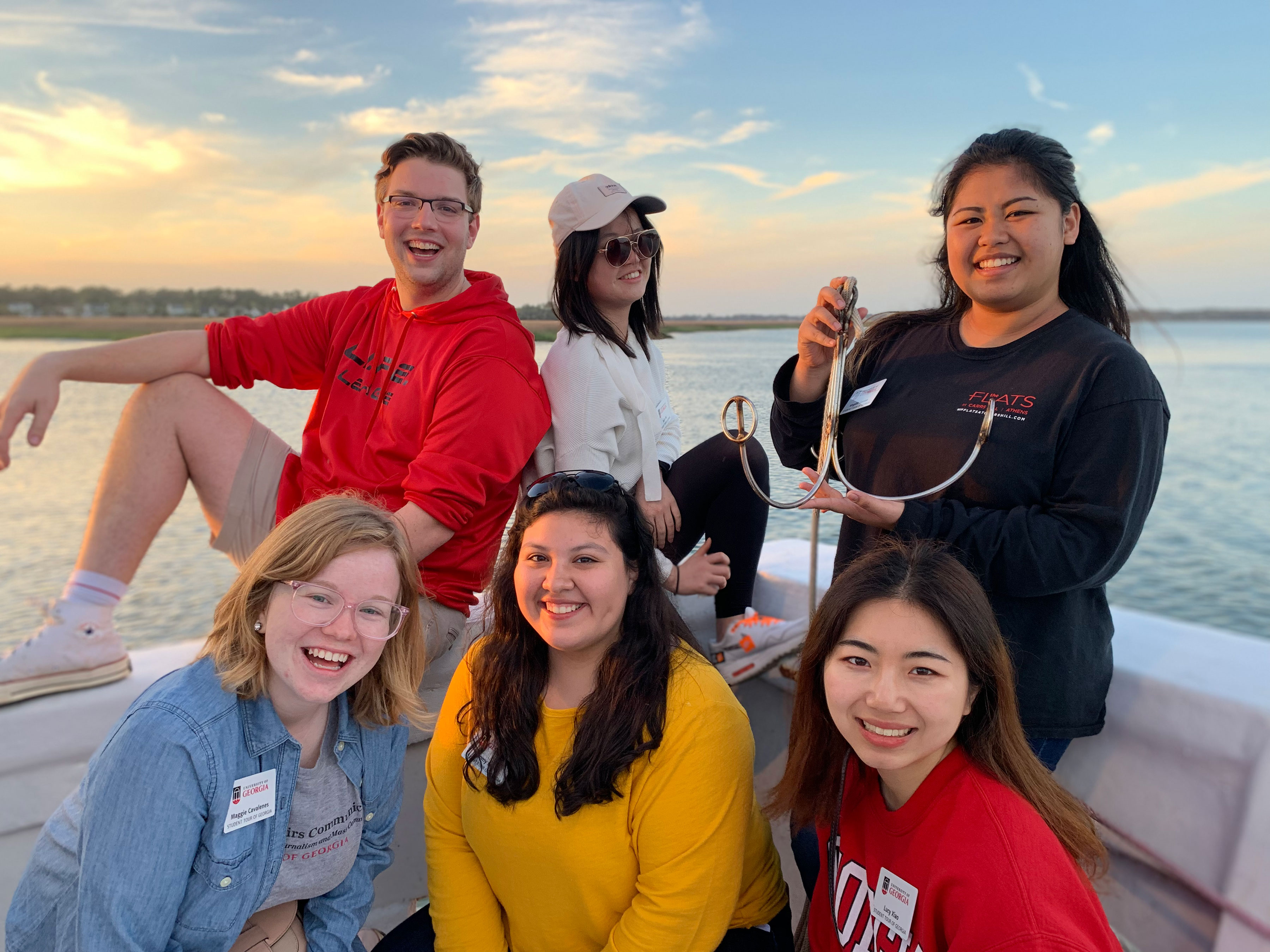
Students visited UGA’s Marine Extension and went on a boat ride at sunset.
On the first morning of the trip, students heard from University of Georgia President Jere W. Morehead and Vice President of Public Service and Outreach Jennifer Frum about the importance of the trip ahead. With 25 students from various majors across campus as well as supervising faculty, the bus loaded up and headed out at 8am on Monday morning.
Day 1:
The tour’s first stop was Jaemor Farms. An hour outside of Athens, we learned about the multi-generational history of the farm from UGA alumna Caroline Black Lewallen (BSA ’11). We were each treated to a delicious fried pie or homemade ice cream. From there, the tour headed to Amicalola Falls to visit one of Georgia’s state parks, and the students climbed around 600 stairs to the top of the falls. At this point it was raining pretty hard, and everyone was thoroughly soaked and ready for a nice hot coffee or tea as we all got to know each other and participated in trust-building exercises at the Amicalola Falls Lodge.
Day 2
The second day of the trip started and ended in Atlanta. We started off the day by visiting the Capitol, and it was many students first time entering the building. We sat in on committee hearings and met the Incoming Vice President for Government Relations Toby Carr (BSAE ’01, BBA ’01), as well as put our photography skills to good use on the staircase.
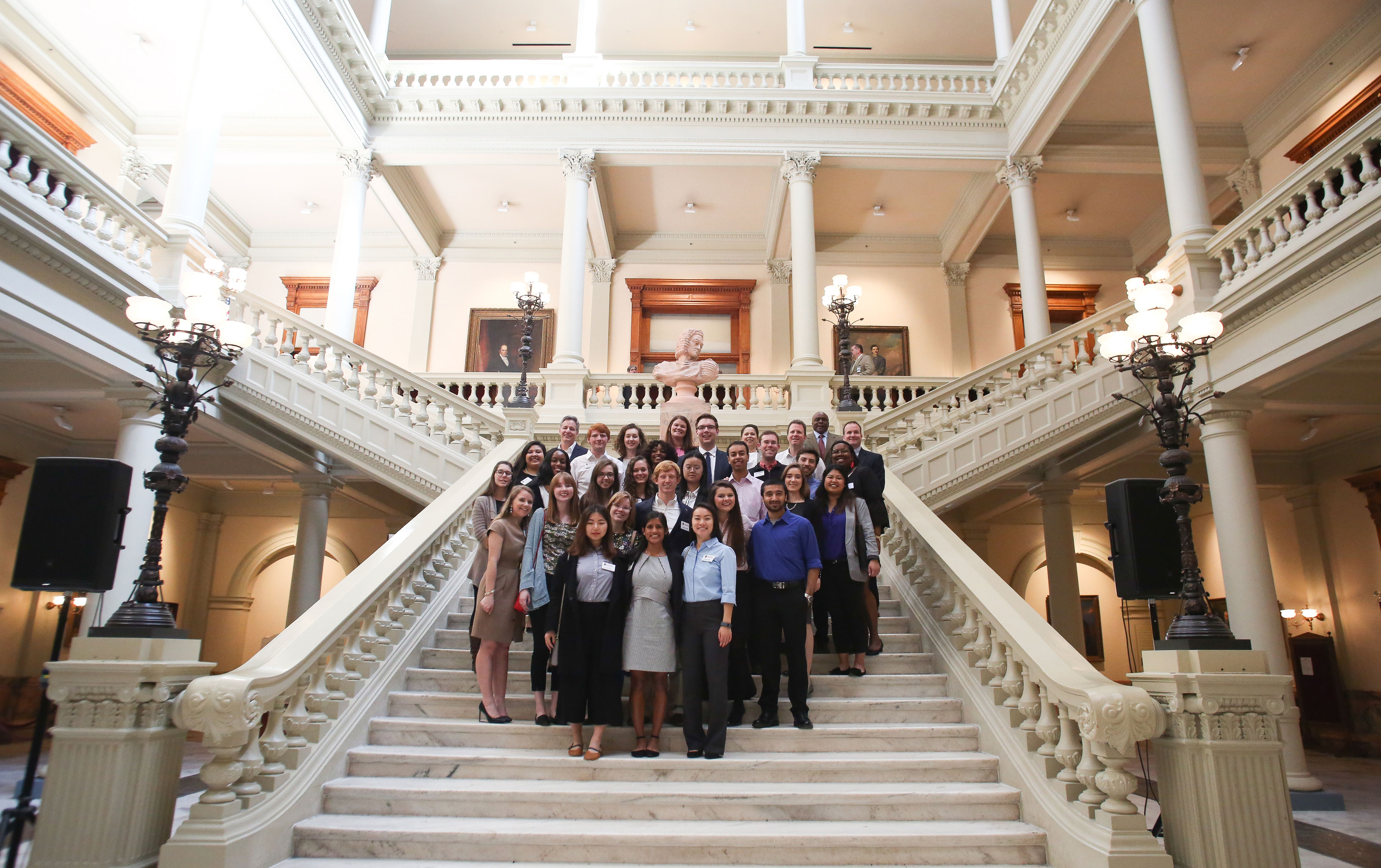
The second day of the tour started at the Capitol in Atlanta. Photo courtesy of the Office of Public Service and Outreach.
From there, we went to the Georgia Experience Center and heard from employees of Georgia Power about how they pitch the state of Georgia to companies who potentially want to open offices or factories here. After that, we went to the Center for Civil and Human Rights and individually toured the three floors of the museum. It was a moving way to remind ourselves of the injustices against human rights that are still happening across the world, as well as reflect on Atlanta’s role in the civil rights movement.
Our final academic stop of the day was Ebenezer Baptist Church where we got to sit in the pews of the church where Martin Luther King Jr.’s family preached. We were told that the church had been made to appear how it looked on the day of Martin Luther King Jr.’s last sermon, which was played for us. It was a surreal experience to hear Martin Luther King, Jr.’s sermon in which he says what he would like his eulogy to be like, considering that sermon became his own self-eulogy. You can listen to that sermon here.
We enjoyed a great dinner with UGA Young Alumni Leadership Council members Daniella Singleton (BS ’08, AB ’08), Shayla Hill (BBA ’08), Anna Reddish (BSA ’08, MADS ’09) and alumni Ryan Reddish (BSFR ’08, MFR ’10) and Black Alumni Leadership Council member Jacinta Smith (BS ’01, MS ’04, DRPH ’21) and past president Raymond Phillips (BS ’12, MBA ’18).
Day 3
Day three kicked off in Fayetteville for a tour of Pinewood Studios. Though we didn’t see any celebrities (and we couldn’t tell you if we did), it was cool to see where the Marvel blockbuster movies are filmed, and learn about the Georgia Film Academy and the “new urbanism” movement in nearby community Pinewood Forest.
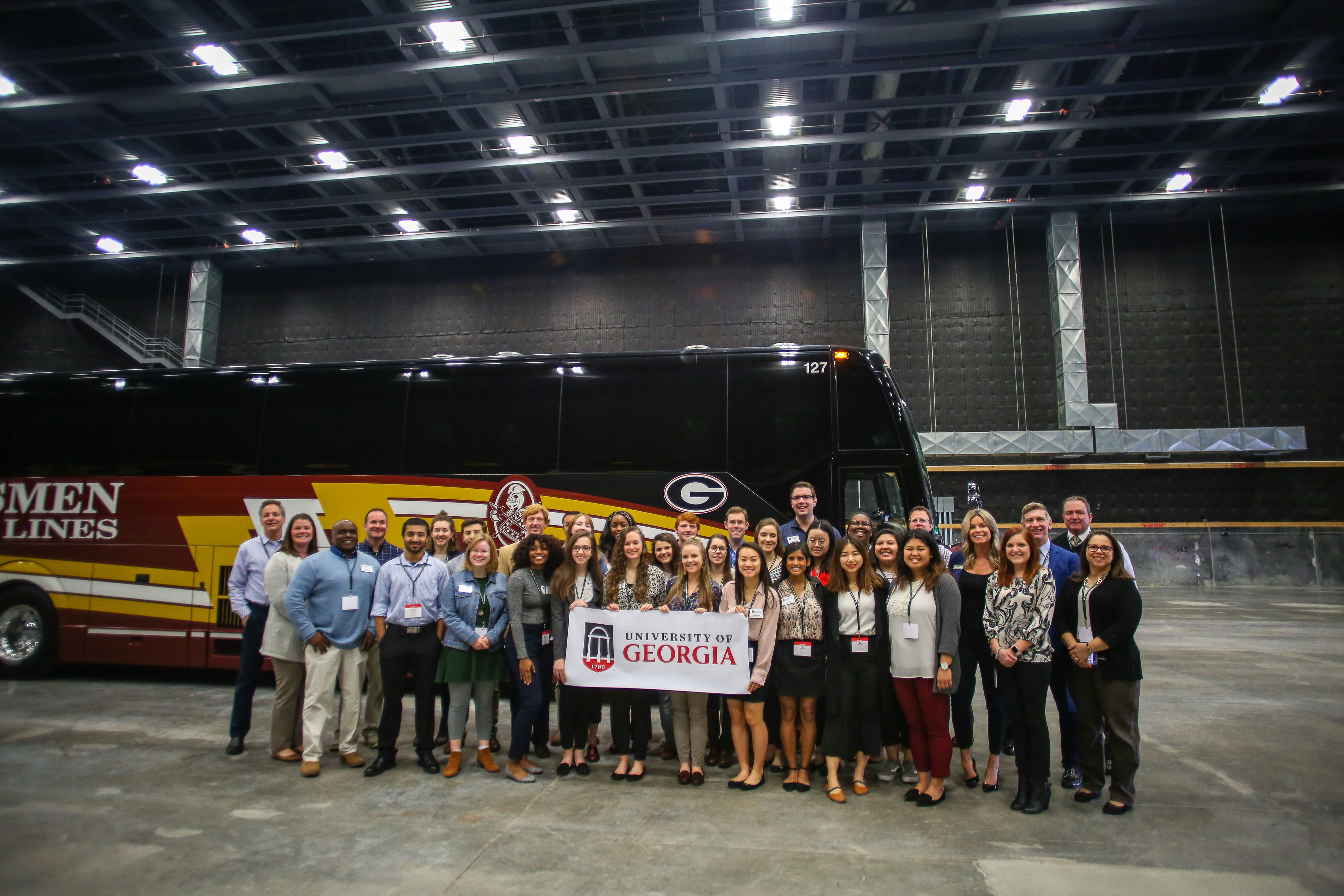
Students got to enter a sound stage at Pinewood Studios. Photo courtesy of the Office of Public Service and Outreach.
After that, we traveled to Macon for a lunch-and-learn. We heard about the economics behind Newtown Macon, an effort to revitalize the city, as well as the Ocmulgee National Historical Park. Our next stop was in Hawkinsville, where we learned about UGA’s Archway programs, and a Youth Leadership Program called LIFE League. From there, we traveled to Albany State University’s campus for a dinner where we learned about their disaster recovery progress in the aftermath of Hurricane Michael. Although Albany State’s students were also on spring break, we enjoyed meeting students from Howard University in Washington, D.C. who were there helping with recovery efforts on their own spring break “impact” trip.
Day 4
On the fourth day of the trip, we visited UGA’s Tifton Campus and learned about what students there are focusing on studying, including going on a tour of an incredibly energy efficient home as well as seeing a demonstration of a drone that can tell farmers how much water their fields need. We also visited UGA’s dairy research facility and pet baby cows, which was a really great time.
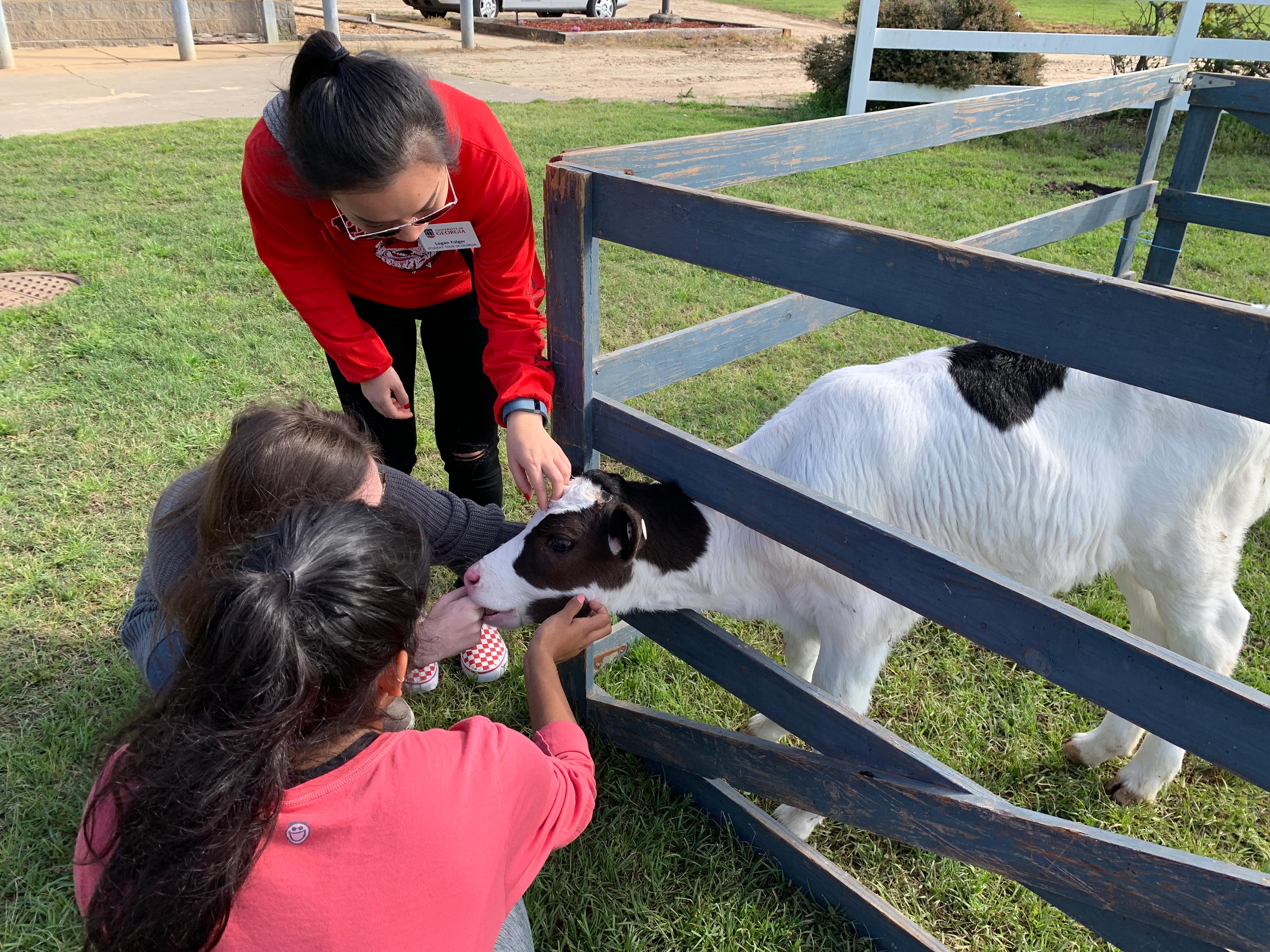
Students got quality time with baby cows at UGA’s dairy research facility.
At the Okefenokee Swamp, we learned all about alligators, including one named Crazy. We got to pet a baby alligator named Tiny, and then took a small boat tour through the swamp, followed by a train tour of another area of the swamp.
Our last stop of the day was UGA’s Marine Extension on Skidaway Island, where we were greeted by none other than Uga X. Remember how petting baby cows AND baby alligators was really fun? We then got to pet and pose for photos with the best dawg, and that’s certainly a lot of students’ favorite memory from the trip.
Day 5
On the fifth and final day of the tour, we woke up in Savannah and went to the Georgia Ports Authority and learned about their work and took a tour of the ports. Next, we went to Gulfstream Aerospace and saw the process behind the construction of $60 million-dollar jets, as well as the creation of simulators for pilot education.
Finally, we stopped in Washington County and enjoyed Dairy Lane milkshakes as we heard from UGA alumna Conni Fennell-Burley (BSHE ’88), an Archway Professional. It was, no pun intended, a sweet finish to the week.
This summary doesn’t even begin to mention the time we spent as a group reflecting on what we had learned that day, starting snack delivery chains on the bus or playing silly bonding games. By the end of the week, we had perfected our group photo pose. While it wasn’t a traditional spring break, I believe an alternative spring break where we got to see so many places in Georgia made us all the more grateful to be at the University of Georgia. UGA is and will continue to be a land–grant and sea–grant university that is committed to making a positive impact on not only the state, but the world.
View our Instagram Story.